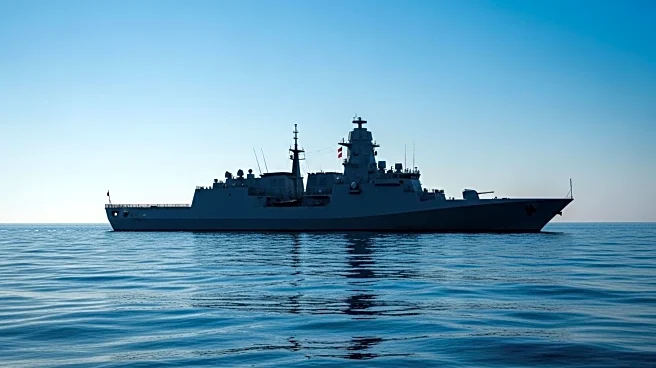What is the story about?
What's Happening?
Italy and Greece have signed a preliminary agreement for the sale of two naval vessels to the Hellenic Navy. The agreement was formalized at the Seafuture trade fair in La Spezia, with key figures such as Italian Minister of Defense Guido Crosetto and Greek counterpart Nikos Dendias present. The vessels, currently in service with the Italian Navy, will be sold through Fincantieri, a prominent Italian shipbuilding company. This deal underscores the strategic cooperation between the two nations and highlights the significance of Italian naval technology. The agreement includes a support package managed by Fincantieri, leveraging its expertise in after-sales services. The vessels are expected to be replaced with new orders soon.
Why It's Important?
This agreement is pivotal for strengthening military ties between Italy and Greece, enhancing their naval capabilities. It showcases the international appeal of Italian naval technology and Fincantieri's role in geopolitical exports. The deal reinforces Italy's position in European shipbuilding and military cooperation, potentially influencing defense strategies in the region. For Greece, acquiring advanced naval vessels bolsters its maritime defense, crucial given regional security dynamics. The partnership may also stimulate economic activity in the defense sector, benefiting both countries through increased industrial collaboration.
What's Next?
The definitive agreement awaits customary authorizations, which will finalize the sale and support package. Fincantieri is expected to manage the transition and provide ongoing support for the vessels. The replacement of these vessels with new orders indicates continued investment in naval technology. Stakeholders in both countries may anticipate further collaborations, potentially expanding to other areas of defense and industrial cooperation. Observers will watch for any geopolitical shifts resulting from this enhanced military partnership.
Beyond the Headlines
The agreement may have broader implications for European defense policy, potentially influencing other nations to pursue similar collaborations. It highlights the role of military technology in diplomatic relations and could lead to increased scrutiny of defense spending and strategic alliances. The deal also underscores the importance of maintaining technological superiority in naval capabilities, which could drive innovation and investment in the sector.
















